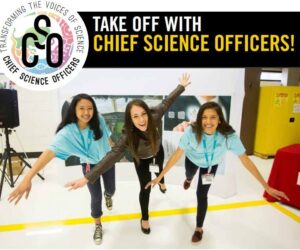 How often do students get the opportunity to be engaged in their education? Seems like a silly question – aren’t they ALWAYS engaged in it, every time they attend a class or work on homework? Yes. But the Chief Science Officers program is providing a way for youth to be immersed in the development of educational science, technology, engineering, and math (STEM) activities in and out of the classroom.
How often do students get the opportunity to be engaged in their education? Seems like a silly question – aren’t they ALWAYS engaged in it, every time they attend a class or work on homework? Yes. But the Chief Science Officers program is providing a way for youth to be immersed in the development of educational science, technology, engineering, and math (STEM) activities in and out of the classroom.
Chief Science Officers (CSOs) are students that are elected by their peers to be ambassadors for STEM and innovation. The vision of the program is to “create and sustain a STEM culture where student voice impacts society.” In an environment where adults normally dictate the decisions, CSOs elevate the student voice in school and community STEM discussions. The program enables kids to interact with adults to help develop ideas and programs for their own education and workforce development.
After being elected by their peers, students attend an induction institute to learn basic skills required to be a CSO. During the academic year they attend state cabinet meetings, interact with CSO peers online, and support STEM awareness activities both at their school and in the community.
Jeremy Babendure, Executive Director of the Arizona Technology Council Foundation, founded the CSO program in 2015 and is thrilled to witness its growth. He sees even greater possibilities for the program and the students involved. “It provides them a unique opportunity to gain skills in communication, leadership and strategic development,” he said. “And for their peers it provides added exposure to STEM activities and awareness of potential STEM careers.”
 Workforce and career connections come from the “SciTech Jedis.” These STEM professional mentors link with the students and provide a bond for the youth to meet and work with someone who is in the field. “As a State Farm Jedi Mentor, I was impressed with the training the students received in speaking, writing blogs, networking and more,” said Leann Steidinger, IT Analyst, State Farm. “Many students shared this was the first time they were surrounded by people like themselves. It allowed them to open up and build connections with other students. The CSO program is a rare opportunity for students and industry to interact!”
Workforce and career connections come from the “SciTech Jedis.” These STEM professional mentors link with the students and provide a bond for the youth to meet and work with someone who is in the field. “As a State Farm Jedi Mentor, I was impressed with the training the students received in speaking, writing blogs, networking and more,” said Leann Steidinger, IT Analyst, State Farm. “Many students shared this was the first time they were surrounded by people like themselves. It allowed them to open up and build connections with other students. The CSO program is a rare opportunity for students and industry to interact!”
The program began in Arizona, where it has successfully engaged high-level community leaders, including mayors, city council members, the Governor, and Arizona Senators and Representatives as well as U.S. Senators and Representatives in conversations with school administrators, teachers, and, most importantly, students.
Over the past few years, CSOs have been invited to Washington, DC, to present the CSO program as a special session at the US Capitol and to White House leadership. Two of the CSOs were invited to a Million Women Mentors meeting and served as a rare student voice in the conversation about women and mentorship. Others attended an International Students Day discussion to inform the nation of needs for education in schools. Hundreds of students have completed the CSO Leadership Training Institutes. They have planned and implemented classroom activities and community events. This month, the first ever International Institute will be held at Kuwait’s Gulf University for Science & Technology.
The Chief Science Officers (CSO) program now includes 320 CSOs representing more than 60,000 students. Through the exposure and collaboration of the STEM Learning Ecosystems Initiative, Chief Science Officer programs are now running in St. Louis, Oregon, and Michigan, with Ecosystems in California, Florida, and Kansas working to implement it as well.
“The CSO program has been welcomed with enthusiasm in Southern Oregon. We have commitments from schools in five districts with the potential to serve 3,782 students in our region and expect five more districts to join for the inaugural cohort,” said Summer Brandon, Executive Director for Armadillo Technical Institute.
Give your students a voice in their STEM education! Learn more about how to implement the Chief Science Officers program in your region here, or contact Jeremy Babendure at jbabendure@aztechcouncil.org.

